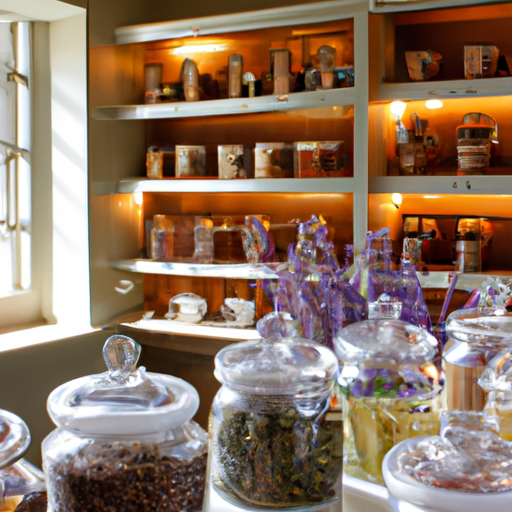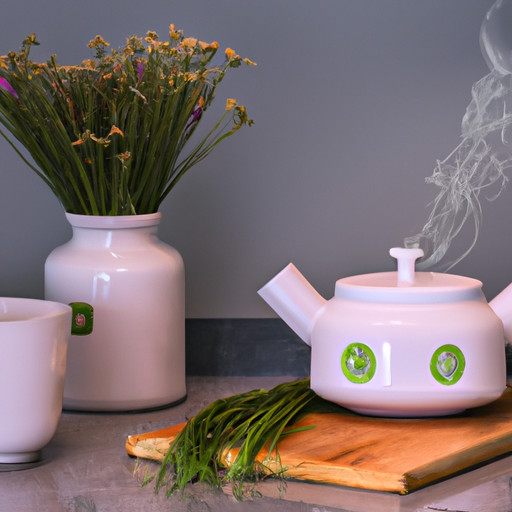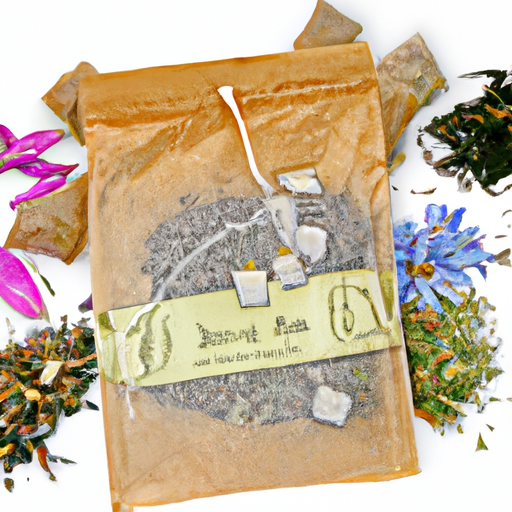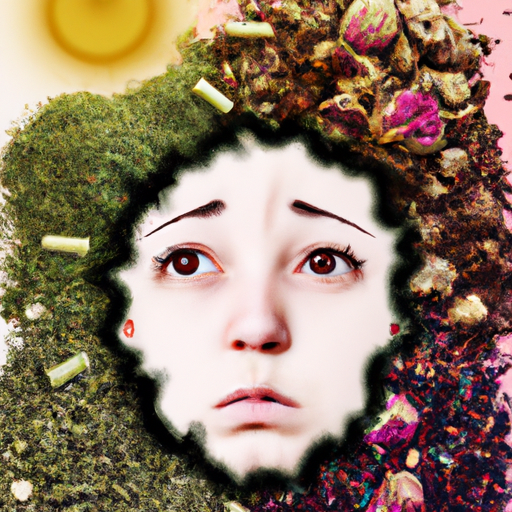Are you ready to embark on a journey of taste and wellness? Join me as I guide you through the world of herbal and botanical teas, and show you how to become a specialist in this delightful and beneficial beverage.
Just like a painter brings colors to life on a canvas, you have the power to create beautiful blends of herbs and flowers that will tantalize your taste buds and soothe your soul.
In this article, we will delve into the basics of herbal tea, explore the art of tea blending, and uncover the science behind this ancient beverage.
We will also learn about different brewing techniques, expand our knowledge of herbal tea culture, and develop our palate for tasting the diverse flavors of nature.
Whether you simply want to enhance your tea-drinking experience or dream of starting your own tea business, this guide will provide you with the knowledge and skills to become an expert in the world of herbal and botanical teas.
So, grab your favorite mug and let’s begin this aromatic adventure together.
Key Takeaways
- Becoming an herbal/botanical tea specialist allows for experimenting with different ingredients and exploring unique flavor combinations.
- Understanding the characteristics of herbal teas is important for pairing them with food and creating unique tea recipes.
- Building relationships with reliable suppliers and sourcing ingredients from reputable sources is crucial for maintaining quality and consistency.
- Starting a tea business as an herbal/botanical tea specialist requires careful planning, commitment to quality, and staying current with the dynamic tea industry.
Understand the Basics of Herbal Tea
To become an herbal tea specialist, you need to understand the basics of herbal tea and how it can benefit your health. Herbal tea has been used for centuries for its many health benefits. It’s known to improve digestion, boost the immune system, and promote relaxation.
There are also various flavors of herbal tea that are popular among tea enthusiasts. Some of the most popular flavors include chamomile, peppermint, and ginger. Chamomile tea is known for its calming properties, while peppermint tea is refreshing and aids in digestion. Ginger tea is great for reducing inflammation and soothing an upset stomach.
By understanding the benefits of herbal tea and the different flavors available, you can begin your journey to becoming an herbal tea specialist.
Dive into the Art of Tea Blending
Exploring the world of blending different flavors creates endless possibilities for crafting unique and delightful tea experiences, with over 3,000 different types of tea available worldwide. When it comes to tea blending techniques, there are several methods to consider. One approach is to focus on balancing the flavors and aromas of different herbs and botanicals. This can be achieved by experimenting with different ratios and combinations until the desired taste profile is achieved. Another technique is to add complementary ingredients like fruits, spices, or flowers to enhance the overall flavor and create a more complex and satisfying tea blend. Sourcing high-quality herbal ingredients is crucial for creating exceptional tea blends. It is important to find reputable suppliers who prioritize freshness, sustainability, and ethical practices. By carefully selecting and blending various herbal ingredients, one can create a truly unique and personalized tea experience.
| Tea Blending Techniques | Sourcing Herbal Ingredients |
|---|---|
| Balancing flavors and aromas | Finding reputable suppliers |
| Experimenting with ratios | Prioritizing freshness |
| Adding complementary ingredients | Ensuring sustainability |
Study the Science Behind Herbal Tea
Dive into the fascinating world of herbal tea and uncover the scientific secrets behind its soothing and healing properties. Studying the science behind herbal tea not only allows you to appreciate its natural benefits, but also opens up a world of career opportunities in the herbal tea industry.
By understanding the bioactive compounds present in different herbs, you can create blends that target specific health concerns. For example, chamomile tea contains compounds that promote relaxation and aid in sleep, while peppermint tea has been shown to alleviate digestive issues.
Learning about the benefits of studying herbal tea science can also help you educate others on the potential therapeutic effects of different herbal teas. Whether you aspire to become a tea sommelier or work in product development, a strong foundation in herbal tea science is essential for success in the industry.
Explore Different Tea Brewing Techniques
Get ready to take your tea brewing skills to the next level as you discover a variety of techniques that’ll elevate your tea drinking experience. To truly become an herbal/botanical tea specialist, it’s important to explore different brewing vessels and tea infusing methods.
Each vessel has its own unique qualities that can enhance the flavors and aromas of the tea. For example, a teapot with a built-in infuser allows the tea leaves to fully expand and release their flavors, while a gaiwan provides a more concentrated and intense infusion.
Additionally, experimenting with different infusing methods, such as steeping, brewing, or cold brewing, can result in varied taste profiles and levels of strength. By exploring these techniques, you’ll be able to create the perfect cup of herbal tea every time.
Expand Your Knowledge of Herbal Tea Culture
Immerse yourself in the rich tapestry of herbal tea culture and uncover the secrets that lie within the traditions, rituals, and customs surrounding this ancient beverage. Herbal tea has long been celebrated for its numerous benefits for health and wellness. From soothing chamomile to invigorating peppermint, each herbal tea variety offers a unique set of properties that can support our well-being.
The cultural significance of herbal tea varies across different countries and traditions. In China, for example, herbal tea is deeply rooted in Traditional Chinese Medicine and is believed to have medicinal properties. In India, Ayurveda emphasizes the use of herbal teas for balancing the body and mind. And in Morocco, the mint tea ceremony is a symbol of hospitality and friendship. Exploring the cultural significance of herbal tea allows us to appreciate the diverse traditions and customs associated with this beloved beverage.
To help you navigate the world of herbal tea culture, here is a table summarizing the benefits of herbal tea for health and wellness, as well as its cultural significance in different countries and traditions:
| Benefits for Health and Wellness | Cultural Significance |
|---|---|
| Supports digestion | Traditional Chinese Medicine |
| Promotes relaxation | Ayurveda |
| Boosts immunity | Moroccan mint tea ceremony |
By expanding your knowledge of herbal tea culture, you can truly appreciate the holistic nature of this ancient beverage and become a specialist in the field.
Develop Your Palate for Herbal Tea Tasting
Developing your palate for herbal tea tasting is like discovering a hidden treasure chest filled with a myriad of flavors, each one a unique and delightful experience waiting to be savored.
To become an herbal tea specialist, it’s crucial to develop a refined palate and understand flavor profiles. Start by tasting a wide variety of herbal teas, paying attention to their aroma, taste, and aftertaste. Take note of the different herbal ingredients and how they contribute to the overall flavor.
Experiment with different steeping times and water temperatures to fully experience the nuances of each tea. Keep a journal to record your impressions and track your progress.
Gradually, you’ll start to identify the subtle differences in flavor and develop a deeper appreciation for the complexities of herbal teas. With time and practice, you’ll become a true connoisseur of herbal tea.
Master the Art of Tea Pairing
When it comes to mastering the art of tea pairing, there are two key points to consider. First, learning how to pair herbal teas with food can elevate your culinary experience to a whole new level. By understanding the flavors and aromas of different herbal teas, you can create harmonious combinations that enhance both the tea and the food.
Secondly, discovering complementary flavors and combinations is essential in creating a balanced and enjoyable tea pairing. Whether it’s the delicate floral notes of chamomile tea with a light salad or the bold and robust flavors of hibiscus tea with a rich chocolate dessert, finding the perfect match can truly elevate your tea tasting experience.
Learn how to pair herbal teas with food
To truly master the art of becoming an herbal tea specialist, you must first discover the perfect pairings between herbal teas and food.
Herbal teas offer a multitude of benefits, including their ability to promote overall health and well-being.
When it comes to pairing herbal teas with food, it’s important to consider the flavors and aromas of both the tea and the dish.
For example, a floral chamomile tea pairs beautifully with light and delicate desserts, while a robust peppermint tea complements rich and savory dishes like lamb or chocolate.
Additionally, herbal teas with citrus notes, such as lemon or orange, can be paired with seafood or salads to enhance their flavors.
By understanding the unique characteristics of herbal teas and experimenting with different food pairings, you can truly elevate your tea experience and become a botanical tea specialist.
Discover complementary flavors and combinations
When it comes to pairing herbal teas with food, understanding the art of complementary flavors is essential. By exploring the diverse world of herbs and botanicals, you can discover unique combinations that elevate both the taste of the tea and the dish it accompanies.
One of the joys of being an herbal tea specialist is experimenting with different ingredients to create delightful harmonies. From soothing chamomile that pairs well with honey-infused desserts to earthy nettle tea that complements savory dishes, there is a vast array of flavors waiting to be explored.
As you delve into this fascinating realm, you’ll find that there are endless possibilities for creating your own tea recipes that perfectly match a variety of culinary delights.
So, let’s embark on this flavorful journey and uncover the wonders of complementary flavors and tea combinations.
Consider Starting Your Own Tea Business
If you’re considering starting your own tea business, did you know that the herbal tea market is projected to reach a value of $5.2 billion by 2026? This is an exciting time to enter the industry and tap into the growing demand for herbal and botanical teas.
One important aspect to consider when starting a tea business is establishing a tea garden. By growing your own herbs, you can ensure the quality and freshness of your ingredients, while also reducing costs.
Additionally, sourcing herbal tea ingredients from reputable suppliers is crucial to maintain consistency and meet customer expectations. It’s important to establish relationships with reliable suppliers who share your commitment to quality.
By carefully selecting and sourcing the best ingredients, you can create a unique and enticing tea selection that will set your business apart from the competition.
Frequently Asked Questions
Can I use any type of tea leaves to make herbal tea?
Yes, you can use different types of tea leaves to make herbal tea. However, it’s important to choose leaves suitable for herbal tea and store them properly to maintain their flavor and potency.
Are there any specific health benefits associated with different herbal teas?
Exploring the cultural significance of herbal teas around the world reveals the diverse health benefits associated with each variety. Examining their role in traditional medicine practices showcases their potential to support overall well-being.
How do I know if a certain herb is safe to use in tea?
To research herbal tea safety, I recommend checking reputable sources like scientific journals, books, and reliable websites. Look for information on the herb’s potential side effects, contraindications, and recommended dosages. Additionally, consult with a healthcare professional for personalized advice.
What are some common mistakes to avoid when blending herbal teas?
One common blending mistake is using too many strong-tasting herbs, resulting in an overpowering flavor. To enhance the flavor of herbal teas, try adding a touch of sweetness with honey or a splash of citrus juice.
How can I incorporate herbal tea into my daily routine for maximum benefits?
To incorporate herbal tea into my daily routine for maximum benefits, I drink it in the morning or before bed. I also experiment with different herbal tea recipes to target specific health goals, like relaxation or digestion.
Conclusion
In conclusion, becoming an herbal/botanical tea specialist is a journey that combines passion, knowledge, and skill. By understanding the basics and diving into the art of blending, you can begin your path to mastery. Studying the science behind herbal tea will further enhance your expertise. Exploring brewing techniques, delving into tea culture, and developing a refined palate for tasting will elevate your skills. If you’re looking for a new challenge, consider starting your own tea business. Embrace the beauty of herbal tea and let it transform your life.










